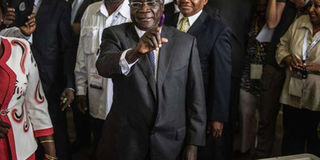Armed conflict in Mozambique getting nasty

Afonso Dhlakama in Maputo, Mozambique on October 15, 2014. PHOTO | GIANLUIGI GUERCIA | AFP
What you need to know:
- Conflict pits Mozambican National Resistance Movement (Renamo) against forces waving the banner of the ruling Mozambique Liberation Front (Frelimo).
- Renamo is led by Alfonso Dhlakama and Frelimo by President Filipe Nyusi.
Armed conflict in Mozambique is getting nasty and if unchecked quickly has potential to add economic and social damages in southern Africa.
The conflict pits the Mozambican National Resistance Movement (Renamo) led by Mr Alfonso Dhlakama, against forces waving the banner of the ruling Mozambique Liberation Front, Frelimo. President Filipe Nyusi is Frelimo’s supremo.
Fast Backward: At independence from Portugal in 1975, splinter groups within Frelimo emerged over capitalist and Marxist ideologies. Additionally, Frelimo was openly pro-Rhodesia—now Zimbabwe—and South Africa’s liberation movements.
White-ruled Rhodesia seized the opportunity to create a Mozambique anti-communist destabilizing force, Renamo, in 1975. When the white rule collapsed, the apartheid South Africa adopted Renamo, only to abandon it when apartheid became history.
An agreement between the Mozambican parties became possible with the 1992 Rome General Peace Accords. Among the provisions were Renamo totally disarming and turning into a political party—it retained an armed group of 300—and the government to integrate Renamo fighters into the national army and civilian life. Both accuse each other of failing to honour the accords
However, since the accords, Mr Dhlakama has contested the presidency and lost in four multi-party elections in which international observers noted massive irregularities. Nonetheless, he put a good showing in six central of the country’s 11 provinces, main mainly in the north.
Although tension existed before 2014 elections—Nyusi won the poll —and forced Renamo in to move its headquarters to Gorongosa region, its base at the apex of power during the civil war, it escalated when government forces captured Renamo headquarters.
CLASHES INTENSIFIED
Despite a peace deal between Dhlakama and Mr Nyusi’s predecessor the following year, clashes only intensified and, with Mr Dhlakama’s refusal to accept 2014 election results and a promise in December to seize the six provinces he claimed Renamo won most votes, an outright guerrilla war erupted.
Has been excessive
In war, innocents, other than non-combatants, don’t exist. Rebels are attacking vehicles, especially on the Benguela Corridor—it connects by rail and road—Malawi, Zambia, and other hinterland countries with Beira, a Mozambique port. The army now escorts convoys.
By all accounts, and particularly the Human Rights Watch and Doctors Without Borders, the government response has been excessive, often indiscriminate force by security forces. Included are burning villages, summary executions et al.
In an article in the May issue of the Washington-based Foreign Policy magazine, two authors have testimonies from witnesses to violence against non-combatants, including of one attempt on Mr Dhlakama’s life.
Other than Frelimo and Renamo political ambitions and non-existent ideological differences, economic issues—especially disparities in favour of southern Mozambique and centralization of power in Maputo has contributed to tensions.
As the matter stands now, Renamo is poised to disrupt the corridor and thus hinterland economies and the country’s exploitation of coal and gas reserves in the country’s north. Add to this increasing investors’ nervousness.
International mediators need emphasise to Maputo dealing with dispairities in resources allocation and decentralising political and economic power—overhauling a system producing a few billionaires and millions of desperados—is the cure.
Offering Dhlakama vice presidency—he turned it down last week—is like going the earing’s way: swinging to nowhere.




